|
|
|
Sort Order |
|
|
|
Items / Page
|
|
|
|
|
|
|
| Srl | Item |
| 1 |
ID:
123140
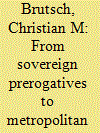

|
|
|
|
|
| Publication |
2013.
|
| Summary/Abstract |
What roles do, can and should cities and their agents play on the international stage? Has the "rescaling" of political authority expanded urban governments' foreign policy space? Can the advocates of urban empowerment exploit cities' growing economic clout to harness urban development? To answer these questions, and to shed light on the international frontiers of metropolitan governance, this study explores the frictions between cities' foreign ambitions and states' collective efforts to preserve their sovereign rights and prerogatives. It proceeds in two parts: to probe the anarchical society's stake in the urban age, the first part maps the transnational activities of cities and their agents. It discusses urban aspirations, surveys foreign engagements and reviews their salience and limitations. To gauge states' collective response to the tentative expansion of metropolitan rule, the second part examines on what terms UN-Habitat, the Cities Alliance and the World Bank harness urban development in poorer and more fragile parts of the world. The study concludes with a critique of the view that international relations are bound to orbit local concerns.
|
|
|
|
|
|
|
|
|
|
|
|
|
|
|
|
| 2 |
ID:
123139


|
|
|
|
|
| Publication |
2013.
|
| Summary/Abstract |
North Korea puzzles many observers. Mostly, it is referred to as the most isolated country in the world, being a timeless mystery, enigma, or terra incognita. While these characterizations reveal the presupposition of a genuine void of knowledge concerning the assessment of North Korean state affairs (however, without preventing scholarship from producing, compiling and depending on information regarding North Korea), they also point to the significance in filling this knowledge gap. The article argues that images play an important role in this operation and provides a discussion of selected photographic essays and single images depicting North Korea. Images work; they do something by evoking a particular perspective of what is shown in them allowing only specific kinds of seeing. Relating the viewer and the viewed in ways that determine what or who is (in)visible, images create boundaries and difference which, in turn, affects who "we" and "they" are.
|
|
|
|
|
|
|
|
|
|
|
|
|
|
|
|
| 3 |
ID:
123141
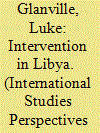

|
|
|
|
|
| Publication |
2013.
|
| Summary/Abstract |
The adoption of Resolution 1973 authorizing intervention in Libya represented the first time that the UN Security Council had authorized military intervention in a functioning and non-consenting sovereign state for the purpose of protecting civilians. A crucial factor prompting skeptical states to allow the passage of the resolution in the absence of sovereign consent was the fact that relevant regional organizations had consented to, indeed appealed for, such action. This article examines this possible shift away from reliance on sovereign consent and toward reliance on the consent of regional organizations in Security Council deliberations about the authorization of military intervention to protect civilians, and it considers what it might mean for the future of civilian protection.
|
|
|
|
|
|
|
|
|
|
|
|
|
|
|
|
| 4 |
ID:
123136
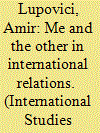

|
|
|
|
|
| Publication |
2013.
|
| Summary/Abstract |
A gap is currently growing between the rich theories in International Relations (IR) and how they are presented in classrooms. Although the scholarly literature acknowledges the complexities of international relations, these notions are not fully integrated into IR courses, especially at the introductory level. I assert that teaching IR through the framework of relations between different me(s) and other(s) would address this problem. In short, I claim that international relations are almost by definition about interactions between a me and an other. Acknowledging this fact will allow us to sharpen a number of important issues and questions in world politics concerning the me(s) (for example, states, ethnic groups, IGOs, NGOs, transnational communities) and their relevant other(s). I contend that this approach helps to capture the multiplicity of actors, interactions, and practices in IR, and to better connect them to the theories in the field. I further suggest that this approach not only provides a fruitful method for teaching IR, but it also allows scholars (and students) to rethink and reflect on the field.
|
|
|
|
|
|
|
|
|
|
|
|
|
|
|
|
| 5 |
ID:
123142


|
|
|
|
|
| Publication |
2013.
|
| Summary/Abstract |
How does transnational terrorism affect the stability of parliamentary governments? Does terrorism cause some governments to fail prematurely and/or does it enhance the probability that some governments will stay in office longer than they otherwise would? Using a duration model on a sample of 18 advanced parliamentary democracies between the late-1960s and 2003, we find that terrorism exacerbates the likelihood of government failure for some governments but not others. Our principal finding is that right-oriented governments are able to keep their hold on power more than left-wing governments when confronted with transnational terrorism.
|
|
|
|
|
|
|
|
|
|
|
|
|
|
|
|
| 6 |
ID:
123137
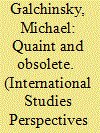

|
|
|
|
|
| Publication |
2013.
|
| Summary/Abstract |
In the "war on terror," the Bush administration sought to delegitimize international human rights law (IHRL), international humanitarian law (IHL), and customary law by claiming that they were "quaint" and "obsolete" in the face of the threat from al Qaeda. On this view terrorist suspects fell into a legal "black hole" and could be deprived of the most basic rights, such as the right to recognition as persons before the law. International law supporters reacted by reconsidering fundamental questions, like the degree to which human rights may be restricted in states of emergency, and the clarity of the civilian/combatant distinction in IHL. In response to the black hole theory, the "full coverage" and "evolutionary" theories identified four principles within IHL and IHRL that enable existing law to address terrorist threats: the principles of complementarity, maximal extension, restricted derogation, and regulated detention. The Obama administration has so far enacted the "evolutionary" approach.
|
|
|
|
|
|
|
|
|
|
|
|
|
|
|
|
| 7 |
ID:
123138
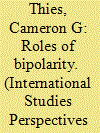

|
|
|
|
|
| Publication |
2013.
|
| Summary/Abstract |
Since the end of the Cold War, scholars have debated the merits of the major theoretical traditions in international relations and foreign policy. Neorealism was criticized for failing to predict the end of bipolarity in material capabilities. Constructivism emerged during this time as a viable alternative explanation for the Cold War based on the role of ideas. This paper seeks to assess the impact of material and ideational factors on the origin, development, and end of the Cold War through an examination of the roles adopted by U.S. Presidents in their foreign policy doctrines. The paper finds that the origin of the Cold War was primarily ideational and was constituted by the "roles of bipolarity" adopted in the Truman Doctrine. During the Cold War, minor variations in these roles can be explained by shifts in material capabilities. The end of the Cold War was the result of changes in Soviet ideas, which were later confirmed by the collapse of the Soviet Union. After the end of bipolarity, we see the United States struggling to identify its proper foreign policy role.
|
|
|
|
|
|
|
|
|
|
|
|
|
|
|
|
| 8 |
ID:
123143


|
|
|
|
|
| Publication |
2013.
|
| Summary/Abstract |
This article examines the ways in which United Nations (UN) peacekeeping missions affect democratic progress and the durability of peace in post-civil war states. After a conflict, UN peacekeeping missions provide security and create incentives for former actors to resolve their differences through peaceful and democratic means. This article contends that by providing support, peacekeeping missions help to initiate a democratic process such that former rivals can claim access to power and resources without resorting to armed conflict. To arrive at this conclusion, this article empirically examines whether UN peacekeeping missions succeeded in promoting democratic progress in postwar states and, subsequently, whether that democratic progress would contribute to the durability of peace. The indirect effect of peacekeeping on stable peace has not been explored in the literature surrounding democratic progress and the durability of peace. From the analysis of the data on post-civil war democratic progress and the durability of peace from 1946 to 2005, I find support for the alternative approach and conclude that UN missions contribute to durable peace in post-civil war states by promoting democratic political processes.
|
|
|
|
|
|
|
|
|
|
|
|
|
|
|
|
|
|
|
|
|